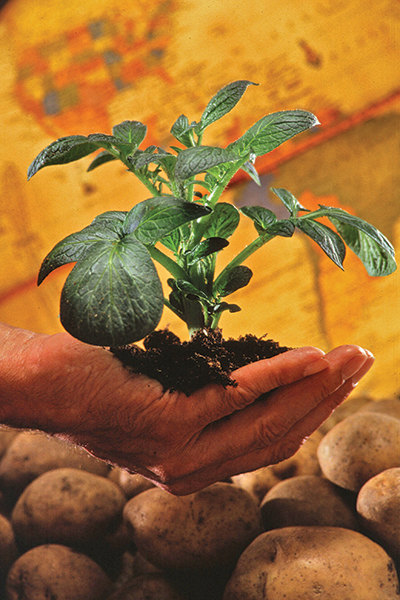JBC: A plant immune system corrects its course
Plant immune systems, like those of humans and animals, face a difficult balancing act: They must mount responses against ever-evolving pathogens, but they must not overdo it. Immune responses require energy and resources and often involve plants killing their own infected cells to prevent the pathogens from spreading.
 Researchers at labs in the UK and the Netherlands studied a receptor protein found in potato plants like this one that detects infection by a virus called potato virus X.Scott Bauer/USDA
Researchers at labs in the UK and the Netherlands studied a receptor protein found in potato plants like this one that detects infection by a virus called potato virus X.Scott Bauer/USDA
Researchers at in England have identified a crucial link in the process by which plants regulate their anti-viral responses. was published in the Journal of Biological Chemistry.
lab at Durham, in collaboration with the laboratories of at Wageningen University and at the University of Amsterdam, studied a receptor protein called Rx1, which is found in potato plants and detects infection by a virus called potato virus X.
Binding to a protein from the virus activates Rx1 and starts a chain of events that results in the plant mounting an immune response. But the exact sequence of cellular events — and how Rx1 activation was translated into action by the rest of the cell — was unknown.
“Our study revealed an exciting, and unexpected, link between pathogen attack and plant DNA,” Cann said.
Specifically, the study showed that Rx1 joins forces with a protein called Glk1. Glk1 is a transcription factor, meaning it binds to specific regions of DNA and activates genes involved in cell death and other plant immune responses. The team found that when Glk1 bound to virus-activated Rx1, it was able to turn on the appropriate defense genes.
When the viral protein was absent, Rx1 seemed to have the opposite effect — actually keeping Glk1 from binding to DNA. In this way, it prevented an inappropriate immune response.
“The immune response involves reprogramming the entire cell and also often the entire plant,” Cann said. “An important part of this regulatory process is not only allowing activation but also making sure the entire system is switched off in the absence of infection.”
More than one-third of the potential global crop harvest is lost to pathogens and pests each year, so breeding plants with better immune systems is an important challenge. Understanding how this immune system is regulated at the appropriate level of activity gives the researchers more ideas of points in the immune signaling pathway that could be targeted to increase the plant’s baseline ability to resist disease.
“To increase (crop) yield, there is an urgent need for new varieties that are resilient to these stresses,” Cann said. “A mechanistic understanding of how plants resist or overcome pathogen attack is crucial to develop new strategies for crop protection.”
Enjoy reading ASBMB Today?
Become a member to receive the print edition four times a year and the digital edition weekly.
Learn moreGet the latest from ASBMB Today
Enter your email address, and we鈥檒l send you a weekly email with recent articles, interviews and more.
Latest in Science
Science highlights or most popular articles

From the journals: MCP
Protein analysis of dopaminergic neurons. Predicting immunotherapy responses in lung cancer. ZASP: An efficient proteomics sample prep method. Read about papers on these topics recently published in 麻豆传媒色情片 & Cellular Proteomics.

Unsheathing the role of myelin lipids in Alzheimer鈥檚 disease
Xianlin Han, an ASBMB Breakthroughs speaker, discussed his pioneering work on lipidomics and the role of sulfatide lipids in Alzheimer's disease.

Ten interesting quotes from the JBC archives
Older papers include archaic quirks and long-abandoned biological concepts. Some show flashes of ideas that grew into their own fields, and others show that some things never change.

Lipid biomarkers hold clues to stroke recovery
Scientists at the University of Arizona found that a lipid mediator accumulates with the waves of inflammation associated with stroke and foamy macrophages.

From the JBC archives: Madness, indoles and mercury-based cathartics
A 1907 paper sought to resolve an ongoing question of whether indole, a bacterial molecule in the gut, could cause insanity if overproduced.

From the journals: JBC
Linking modified cysteines to cell migration. Recognizing protein tags for degradation. Disrupting C. difficile toxin production. Read about recent JBC papers on these topics.

.jpg?lang=en-US&width=300&height=300&ext=.jpg)